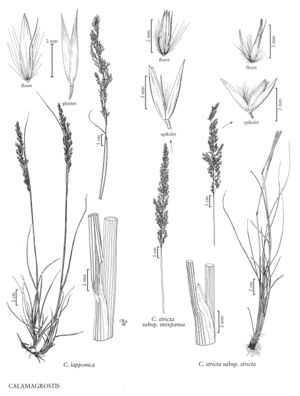Calamagrostis stricta subsp. inexpansa
Plants apparently without sterile culms. Culms (29) 35-75 (120) cm, usually scabrous, sometimes smooth. Sheaths and collars usually smooth, collars sometimes scabrous, rarely pubescent; ligules (0.5) 2-5.5 (6) mm; blades (5) 11-24 (34) cm long, (1.5) 2-5 (6) mm wide, flat, usually stiff, sometimes puberulent. Panicles (6) 8-11 (29) cm long, (0.8) 1-2 (2.8) cm wide, pale green, sometimes purple-tinged; branches (1.5) 1.6-5 (9.5) cm, spikelet-bearing to the base. Spikelets 3-4 (5) mm; rachilla prolongations 1-1.5 mm. Glumes broadly keeled or rounded; callus hairs (2) 2.5-3 (4.5) mm, (0.5) 0.7-0.9 (1.3) times as long as the lemmas; lemmas 2.5-3.5 (5) mm, 0.1-1 (1.4) mm shorter than the glumes; awns 2-2.5 mm, attached to the lower 1/10 – 2/5 of the lemmas, rarely beyond the midpoint, straight or somewhat to strongly bent; anthers (0.9) 1.5-1.8 (2.4) mm, often poorly developed, sterile and indehiscent. 2n = 28, 56, 58, 70, 84-±120.
Discussion
Calamagrostis stricta subsp. inexpansa differs from subsp. stricta in its more robust growth and coarser habit. In North America, it extends from Alaska to Labrador and Newfoundland and south to California, Arizona, Minnesota, Iowa, Ohio, and New York. It also grows in northeastern Asia. This subspecies usually grows in moist meadows, sphagnum bogs, and grasslands associated with rivers and streams, and less frequently on grassy slopes, in open woods, and beside sand dunes. It is noted to grow at the edge of, rather than in, wetlands.
Plants of the Athabasca sand dunes in northern Saskatchewan, and similar habitats in northeast Alberta, have unusually long inflorescences and inflorescence branches.
A taxon with glumes that are thick and rounded at the base, rather than keeled, has been separated out as Calamagrostis crassiglumis Thurb., with a distribution along the Pacific coast from British Columbia to California. We have examined many such specimens, including the isotype, an unusually short specimen, at 15 cm tall, from a "sphagnum swamp". As far as the two character states described above are concerned, the specimens do not appear to be distinct from other individuals of C. stricta subsp. inexpansa. The specimens do differ in other characters from typical C. stricta subsp. inexpansa in that C. crassiglumis is generally shorter, and the culm leaves may diverge from the stem at a greater angle and be broader. Further investigation is warranted.
Selected References
None.
Lower Taxa
"decumbent" is not a number.
